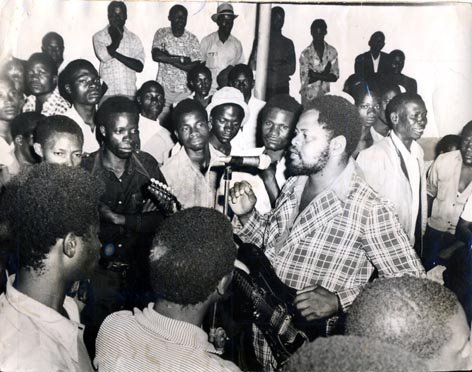ZILIZOPENDWA; PART A
If your first memory is about
hunger, struggles and abuse, you are more likely to be half whom you would be
if the memory was of love, care and understanding. I am of the view that
children should be treated in the best manner possible with tender where
parents and state sacrifice to provide immediate needs. This does not rub out
disciplining. To change most of the things around, we will have to fake our
lives and show children the best of us before they gradually learn our faults
in the long run. A child grows up to appreciate and remember the first memories
and experiences.
After three months or so dad
would come from Nairobi. He bought new Paka Power three pair batteries for his
big radio ever packed in a box and hanged well in the bedroom in the care of
mom; looking at for bedtime memories. He would knock about the cassettes on the
hand to scare cockroaches, confirm the missing ones and dare I produce before
he strikes me down. I would then say how I took them to friends. Warnings and
caning. After such a good work, fulfilling all hardships caused by me as per
mother’s letters to him, he rested with a cassette pivoting on a pen. This was
followed by some booming music that relatives and neighbours confirmed that my
dad has come. Mom would also take a foreign calm position. Zilizopendwa was on.
 |
| Pic: Baraka Mwisheshe during a live band. He is known of his great contribution to East African music. Source: Web |
The best music at such a time was
Christmas Sunday school chorals and sweet circumcision jets. Seeing dad taking
to dancing on the cow-dung cemented floor, after tasting ‘medicine’ that I had
been sent to buy in Dan’s banana plantation. May his soul rest in peace. He
left a young Kalenjin widow. Dancing went on. Mom would pretend not to like
doing Mh! Mh! Sounds. Maybe it was because we were around preventing her to
openly showcase her cupboarded youth. The way he used to dance is what I think
I do late in the night after watching a Shakespeare Production or concluding a
moving book.
Zilizopendwa. Dad is dancing to
some Msondo tunes and none is singing. Just musicals. As he continues, let us
get off the title. The harbour of this music is in Tanganyika and later influenced
to Kenya. It was majorly a socialist-aimed music that show-casted the freedom
Tanganyika had from colonial rule. Unlike Jamaicans, Julius Nyerere aimed at
quickly focusing on people’s development as unit- socialism. There was no time
to sing about the devilish white but to bury the past and start anew. It is in
Tanzania that two antagonist allies reined- British after Germans. We happened
to have magnified our Mau Mau burglary doing and crowned the British boy
presidency forgetting that Nyerere and Nkrumah were Africa’s vision bearers.
Nelson Mandela is a favoured man and cannot be compared in dynamics of policy
and leadership as Nyerere. He despised flag freedom and empty anthems. He
championed for the independence of other states. To know a great leader, one
looks at the preceding leadership. It speaks much of the past leader. And what
speaks best of a time than music? Back to our ongoing music.
If uncle X din't come in to
rather wait for the day’s changed menu and make us be sent out of the chairs
and room to the kitchen and wherever for I was too young to eavesdrop, I could
have had time with dad and drop a list of school and home needs the very day.
After learning that he could get emotional in a talk or rather fear him, sister
and I took to writing. No list was ever fully catered for. The joy of dancing
was no longer in him. As if he had not prepared for us, he would highly
question the education system and terming it a failure. It was not as good as
when he schooled. Afro by Les Wanyika was still new to his ears. That is dad.
Zilizopendwa accommodates diverse
views that aim to integrate a society and make it a better place to live in its
current struggles of independence. Musicians were volunteers in society
determined to sing their love and showcase their nationhood in music. Using
Swahili as the fastest growing and easily learned as a result of majority Bantu
population in the region, the songs were able to spread quickly and lighten up
the clubs in the city under the sun- Nairobi. It is these clubs that promoted
promiscuity. Grand ma always warned my elder cousins indirectly against sexual
carelessness by saying ‘Norore ga Amose
yarora mu Jibikana Club’-You will see what Amos saw in Jibikana (preferably
Nairobi Club) Club.
Amose is the proverbial village man who got an STD in the
capital. When he came home, his strange illness was talked in whispers and
frowns. No one could come near his death bed. It was strange for a person to
start dying from the groins and melt into bones and skull.
She has lost sons. I have lost
uncles. Zilizopendwa was commercialized with bar owners taking in much from the
drinks as singers are paid to eat and wake up again to sing. Cassettes were too
expensive to produce and had no market in the cassetless-radio homes. Live
bands were the only option. Daudi Kabaka, the Tiriki enigma died poor in
materials but rich in contribution to the society.
So what are the songs?....PART B
Comments
Post a Comment